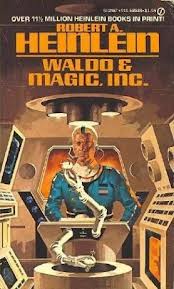(I have copied this post from the Science Fiction blog because it was written as an introduction to some further comments on Poul Anderson's Operation Luna.)
The premise of Robert Heinlein's "Magic, Inc." is that magic works and
is practised like a set of technologies. Magical practice is based on
the reality of supernatural entities and forces, not on any new theory,
discovery or application of the natural sciences. Thus, "Magic, Inc." is
fantasy, not science fiction (sf).
We might call it "hard fantasy" to indicate that the implications of the
premise are deduced as rigorously as are the consequences of any new
technology in hard sf.
Two other "hard fantasies":
in The Anubis Gates by Tim Powers, there is time travel to
historical periods with circular causality as in an sf novel but here
the time travel is one of several applications of magic;
in Black Easter/The Day After Judgement by James Blish, demons are real.
Blish wrote mostly hard sf. It is possible, when reading his fantasies,
to forget that they are a different genre from his sf. Indeed, some of
his characters find it hard to believe that their high technology
coexists with demons. In fact, Black...Judgement is the second
volume of a trilogy about the conflict between secularism and
supernaturalism. Volumes I and III remain ambiguous but it is a premise of Volume II that demons exist and are
neither technological nor extraterrestrial but supernatural.
Showing posts with label Waldo. Show all posts
Showing posts with label Waldo. Show all posts
Sunday, 9 September 2012
Tuesday, 4 September 2012
Heinleinian Origins
In his Introduction to Operation Chaos (New York, 1995), Poul Anderson explains that this work develops a theme that had originated in "Magic, Inc.," by Robert Heinlein. What we retain from a book read decades ago is our always incomplete and sometimes mistaken memory of its content. Such memories lack scholarly precision. However, since I am currently rereading not Heinlein but Anderson, let me exercise memory alone by summarizing what I remember, or misremember, of two Heinlein works.
"Waldo" and "Magic, Inc.," two short narratives published in a single volume, are conceptually connected though without any direct cross-reference. "Waldo" is the source of the technical term "waldo." In that story, characters perform otherwise impossible feats by accessing energy from another universe. One obvious question, not raised in this work, is whether that other universe is inhabited. "Magic, Inc.," can be seen as replying affirmatively.
In the second story, "...magic works - and is treated quite matter-of-factly as a set of technologies." (Introduction)
Thus, a transport company uses a flying carpet. Since magic does not work on or above consecrated ground, a carpet flying above a church falls straight down onto the church, thus raising legal issues like insurance claims and compensation payments. Hence, Anderson's descriptive phrase, "matter-of-factly." Supernatural realms and beings like Hell and demons exist. Near the end, our heroes visit Hell and confront Satan who convenes a gathering of all his demons.
Neil Gaiman has said that that demonic gathering inspired a similar Infernal crowd scene in his graphic series, The Sandman. In graphic fiction, of course, we do not read a description but literally see the demons as drawn to the author's instructions.
In Operation Chaos, which I am about to reread, magic works and is treated as a technology and the narrative ends with a raid into Hell. Thus, it is appropriate to acknowledge Heinleinian inspiration which Anderson does both in the Introduction and by dedicating the book to Robert and Virginia Heinlein, the latter possibly having influenced at least the name of the heroine.
"Waldo" and "Magic, Inc.," two short narratives published in a single volume, are conceptually connected though without any direct cross-reference. "Waldo" is the source of the technical term "waldo." In that story, characters perform otherwise impossible feats by accessing energy from another universe. One obvious question, not raised in this work, is whether that other universe is inhabited. "Magic, Inc.," can be seen as replying affirmatively.
In the second story, "...magic works - and is treated quite matter-of-factly as a set of technologies." (Introduction)
Thus, a transport company uses a flying carpet. Since magic does not work on or above consecrated ground, a carpet flying above a church falls straight down onto the church, thus raising legal issues like insurance claims and compensation payments. Hence, Anderson's descriptive phrase, "matter-of-factly." Supernatural realms and beings like Hell and demons exist. Near the end, our heroes visit Hell and confront Satan who convenes a gathering of all his demons.
Neil Gaiman has said that that demonic gathering inspired a similar Infernal crowd scene in his graphic series, The Sandman. In graphic fiction, of course, we do not read a description but literally see the demons as drawn to the author's instructions.
In Operation Chaos, which I am about to reread, magic works and is treated as a technology and the narrative ends with a raid into Hell. Thus, it is appropriate to acknowledge Heinleinian inspiration which Anderson does both in the Introduction and by dedicating the book to Robert and Virginia Heinlein, the latter possibly having influenced at least the name of the heroine.
Subscribe to:
Posts (Atom)

